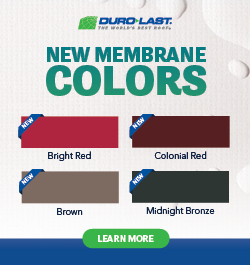Find out the Advantages of SBS Modified Asphalt for Your Customer

By Joseph Pass, MB Technology
Contractors can help educate building owners about the benefits of SBS modified asphalt for better roofing system performance.
Buildings today incorporate lighter-weight structural materials than those built years ago. Contemporary roofing systems should, therefore, have the ability to withstand the increased substrate movements and deflections. Durability of the roof can be assured through good planning and by the correct specification and installation of the waterproofing system. Understanding the benefits and ongoing research of roofing systems and being able to communicate new ideas or technologies to building owners is a great benefit and sales tool for roofing contractors.
Asphalt is still the best-known waterproofing material. However, it has poor aging characteristics, becomes brittle in cold weather, is fluid in hot weather, and has little resistance to fatigue. Elastomeric compounds such as SBS (styrene-butadiene-styrene) substantially improve these properties. SBS rubber is flexible and has the memory to return to its original form. The addition of SBS rubber to asphalt increases the flow characteristics and improves the low-temperature flexibility and fatigue resistance of roofing asphalt. The end product is a high-performance, 2-3 ply system. Some of the advantages of the system are:
Flexibility of application method:
- Heat welded: Ideal for areas where it is impractical to use hot asphalt (e.g., hospital, schools, and high-rises).
- Cold adhesive: Minimizes the presence of any odor during the project.
- Hot asphalt: The most economical way to apply the membrane. Better suited for new construction and larger projects.
- Self-adhesive: Ideal for projects where the above installation methods are not feasible.
Compared to single ply membranes, which are applied in one layer of 40-80 mils thickness, SBS modified systems are applied in 2-3 ply applications, ranging from 220 mils to 300 mils thickness. The redundancy of multiple layers reduces the chance of workmanship error and increases the ability to withstand traffic and numerous penetrations within the roofing system.
SBS Modified Asphalt Roofing Systems utilize a minimum of two layers (smooth & granulated) in constructing the flashing. Unlike single ply roofs which only have one layer of 40-80 mils thick in their flashing the superior construction gives the flashing more ability to withstand movement and temperature fluctuation. SBS Modified bitumen performs even after 10,000,000 cycles of fatigue testing, while blown bitumen and APP modified bitumen fail in the early stages.
For more information, visit MB Technology’s website at http://www.mbtechnology.com/advantages-of-sbs.




















Comments
Leave a Reply
Have an account? Login to leave a comment!
Sign In